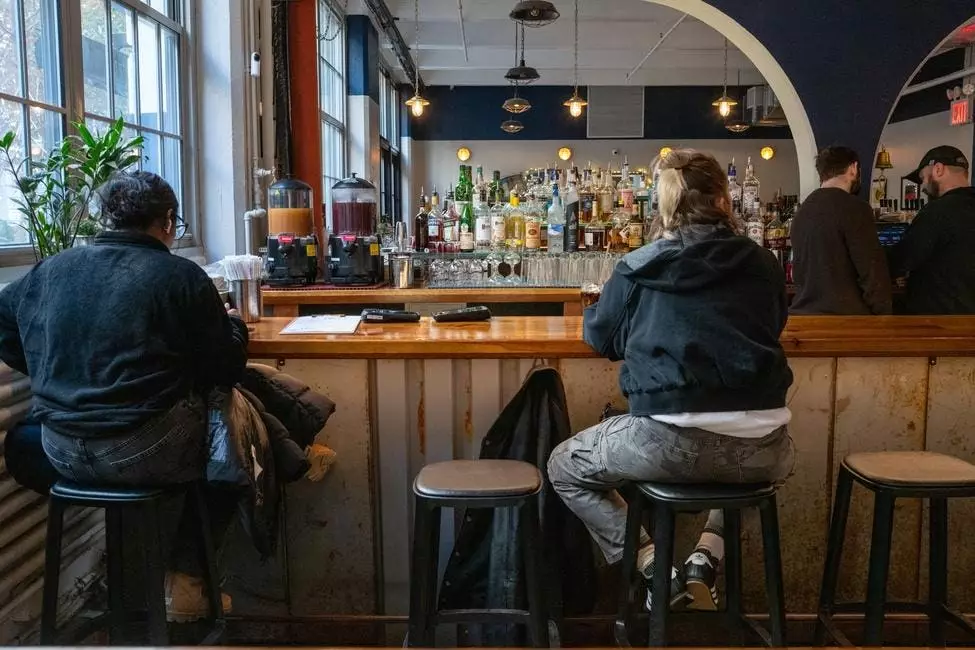For decades, alcoholic beverages have been ingrained in the fabric of American culture. From celebrations to casual gatherings, the presence of alcohol has often been viewed as an essential component of social interaction. However, as U.S. Surgeon General Dr. Vivek Murthy recently highlighted, it may be time to recalibrate our understanding of alcohol’s role in our lives. In his advisory, Murthy pointed to alarming statistics that associate alcohol consumption with approximately 100,000 cancer cases and around 20,000 death annually, a fact that is unfortunately not widely recognized by the general public. With less than half of Americans identifying alcohol as a cancer risk, there is a pressing need for improved public awareness and education.
The Surgeon General’s call to action includes advocating for more explicit health warnings on alcoholic beverages. This initiative reflects a broader cultural transformation that is already taking root, as many Americans begin to critically evaluate their relationship with alcohol. In an era marked by shifting attitudes and emerging lifestyles, can we anticipate a significant reevaluation of how we integrate alcohol into our social lives?
The COVID-19 pandemic acted as a catalyst for altering social habits, with alcohol consumption markedly increasing during its peak. Many individuals turned to drinking as a coping mechanism, leading to a reported rise of over 20% in heavy drinking among adults. While this spike in consumption might have felt like a temporary refuge during stressful times, emerging patterns indicate that these behaviors have persisted for some individuals even post-lockdowns.
However, a fascinating twist is unfolding as younger generations, particularly Gen Z and Millennials, seem to be steering the conversation towards moderate or no alcohol consumption. According to recent surveys, 61% of Gen Z plans to drink less in the coming year, indicating a paradigm shift in how younger people approach alcohol use. Millennials are similarly cognizant, reducing their weekly drinking by 40%. The motivations behind these changes often include desires for better health, financial savings, mental clarity, and improved physical fitness. This trend signifies not just a personal choice but a broader cultural movement prioritizing wellness over indulgence.
Within this broader narrative, the sober curious movement is gaining traction. This movement encourages individuals to reconsider their instinctual response to drink in social settings, shifting the focus away from an automatic “drink-in-hand” mentality. An impressive 41% of Americans have declared intentions to drink less, as 26% identify themselves as “mindful drinkers.” This evolution reflects a growing cultural understanding that socializing can occur without reliance on alcohol, promoting an inclusive atmosphere where everyone can feel comfortable, regardless of their drinking choices.
Accompanying this shift is the emergence of innovative, alcohol-free alternatives. Elevating the non-alcoholic beverage market has produced sophisticated mocktails, alcohol-free wines, and zero-proof spirits that cater to diverse palates. Bars and restaurants are tapping into this trend, crafting menus that cater to non-drinkers and allowing them to engage fully in social experiences without resorting to sugary sodas.
As society redefines its relationship with alcohol, alternative forms of socializing are emerging. Rather than traditional bar outings, modern gatherings may involve activities such as yoga, art classes, or communal cooking sessions, enhancing social ties in healthier environments. The rise of cannabis-infused beverages, with their promotion as relaxing, health-aware options, is also reshaping social scenes, contributing to a broader selection of how individuals can Experience leisure without alcohol.
Moreover, financial factors cannot be ignored. With rising inflation and increased living costs, many individuals are opting to cut back on extravagant expenditures, including alcoholic drinks. This phenomenon mirrors economic trends from the past, where financial pressures redefined consumption behaviors. Today, as individuals grapple with tighter budgets, many are questioning whether they want to invest in alcohol at all.
The Surgeon General’s advisory serves as an urgent reminder as part of a larger conversation around health, personal choice, and community connection. Could we be on the verge of an epoch akin to past anti-smoking campaigns, where societal attitudes toward alcohol consumption shift dramatically? The current discourse suggests we are at a crossroads, with increasing awareness encouraging many to pause and reflect on the implications of their drinking choices.
Amidst these changes, familial bonds, celebrations, and shared moments of joy will remain integral aspects of life, transcending the beverage in hand. Building a culture around choice and health constitutes the crux of this evolving narrative; whether choosing to savor a THC-infused mocktail or simply a sparkling water, individuals are reclaiming their right to define how they socialize.
The changing landscape of alcohol consumption reflects a significant cultural transformation, resonating with a generation eager to pursue healthier lifestyles. The concurrent rise of the sober curious movement, innovative non-alcoholic beverages, and alternative social practices suggests a future where socializing is not synonymous with drinking. As this dialogue unfolds, we can anticipate a richer, more diverse exploration of how we connect and celebrate life together.


Leave a Reply